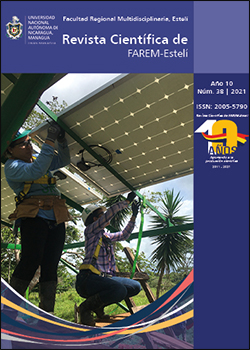Development of teaching competencies in the subject Didactics of Social Sciences. Experience in the Social Sciences career of the UNAN-Managua, Nicaragua
DOI:
https://doi.org/10.5377/farem.v0i38.11945Keywords:
Research, didactics; competencies, Social SciencesAbstract
The following are the results of a research conducted in the field of education, applying action research as a research method, carrying out a didactic intervention in the subject Didactics of Social Sciences. The didactic intervention lasted fifteen weeks, and in each of the learning sessions didactic strategies were applied that allowed for the significative learning of the teachers in training, such as the realization of teaching situations related to the learning of Social Sciences and that allowed them to develop pedagogical competences. Another aspect that allowed the achievement of these competencies was that after each learning session there was a practical class, linked to the context of the Social Sciences classrooms. The last aspect of relevance in the study was that a didactic project was carried out as the culmination of the course. This work consisted in the elaboration in teams of three members of a didactic proposal in one of the subjects of Social Sciences in Secondary Education. As a result of this didactic experience, students with a vocation for teaching in the area of Social Sciences were obtained, in addition, scientific and methodological mastery of the subject they worked on in their didactic proposal was achieved.
Downloads
References
Delval, J. (1983/1993). Crecer y Pensar. La construcción del Pensamiento en la Escuela. (2da Reimpresión). Buenos Aires: Paidós.
Escribano, A. (2004). Aprender a Enseñar. Fundamentos de Didáctica General (2da Edición). Cuenca, España: Universidad de Castilla.
Goetz, J. y LeCompte, M. (1988). Etnografía y diseño cualitativo en la investigación educativa. Madrid: Morata.
González, A. (2003, octubre-diciembre). Los paradigmas de investigación en las ciencias sociales. ISLAS, 45(138):125-135.
Gurdián-Fernández, A. (2007). El Paradigma Cualitativo en la Investigación Socio-Educativa. San José: PrintCenter.
Kemmis, S. y Mctaggart, R. (1992). Cómo Planificar la Investigación Acción. Barcelona: Laertes.
Latorre, A. (2003). Investigación acción. España: Graó.
Latorre, A. (2007). La investigación-acción. Conocer y cambiar la práctica educativa. Barcelona: Graó.
Martínez, R. (2007). La investigación en la práctica educativa: Guía metodológica de investigación para el diagnóstico y evaluación en los centros docentes. Madrid: CIDE.
McKernan, J. (1999). Investigación-acción y currículum: métodos y recursos para profesionales reflexivos. Estados Unidos: Morata.
Orozco, J. Huembes, X. y Gudiel, V. (2001). Propuesta Didáctica para la enseñanza-aprendizaje del contenido los 30 años del periodo conservador para generar en los alumnos un aprendizaje significativo en el I año de Secundaria del Instituto Autónomo Experimental México de Managua, durante el II semestre 2000. Trabajo Monográfico de Licenciatura. Managua: UNAN-Managua.
Orozco Alvarado, J. (2016b, septiembre). La Investigación Acción como herramienta para Formación Docente. Experiencia en la Carrera Ciencias Sociales de la Facultad de Ciencias de la Educación de la UNAN-Managua, Nicaragua. Revista Científica de FAREM-Estelí. Medio ambiente, tecnología y desarrollo humano, (19):5-17. Recuperado el 27 de abril de 2018 de, http://repositorio.unan.edu.ni/6266/1/272-982-1-PB.pdf
Orozco Alvarado, J. (2018). La Didáctica de las Ciencias Sociales. Fundamentos Teóricos y Modelación de Unidades Didácticas. Nicaragua. Editorial Universitaria Tutecotzimí, UNAN-Managua.
Orozco Alvarado, J. y Díaz, A. (2017a, marzo). La simulación como estrategia didáctica para desarrollar comprensión en la asignatura Historia. Intervención didáctica realizada en Educación Secundaria. Revista Científica de FAREM-Estelí. Medio ambiente, tecnología y desarrollo humano, (6):4-13. Recuperado el 27 de abril de 2018 de, https://rcientificaesteli.unan.edu.ni/index.php/RCientifica/article/view/306/278
Universidad Nacional Autónoma de Nicaragua, Managua (2011). Modelo Educativo, Normativa y Metodología para la Planificación Curricular. Managua: UNAN- Managua: Autor
Published
Issue
Section
License
Copyright (c) 2021 Revista Científica de FAREM-Esteli

This work is licensed under a Creative Commons Attribution-NonCommercial-ShareAlike 4.0 International License.



